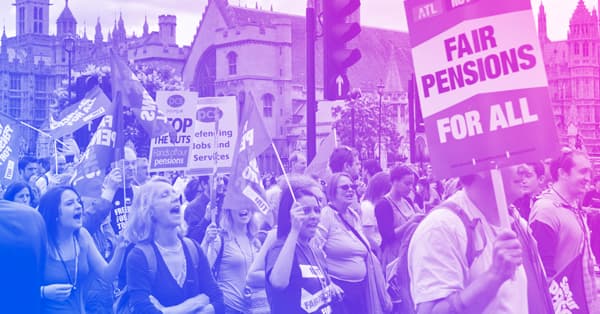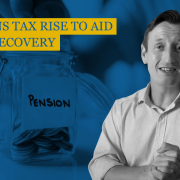
Are UK pension strikes looming?
One of the biggest news stories in Europe last week was surrounding the strikes in France over proposed pension reforms. Should this come as a shock? We have seen similar protests recently in Chile and Spain and the topic has been breached by political parties in the UK with the forthcoming General Election.
So what is the issue? Well, in a nutshell, people are living longer and, therefore, funding their retirement is becoming more expensive. Is the burden of funding this stage of life the job of the state or the job of the individual? Should individuals be saving throughout their working life in order to ensure that they can enjoy life to the full post working or should the state pay this for them?
It is easy to say that the answer is that people should simply save more money. Undoubtedly that is apart of it, but what vehicles do they use? What if they retire in a different country to that which they have a pension? What if they move around during their retirement? What if they can’t afford to save more? Get advice. These are all the kinds of questions that have answers and can be talked through.
One thing that cannot really be argued with is that those of us who plan early and commit to funding our future are much more likely to be in a position where we can enjoy our retirement and make the most of that stage of life.
See below recent BBC News Article:
Macron pension reform: Strike continues for second day
The second day of a strike over French President Emmanuel Macron’s planned pension reforms has disrupted key services across the country.
Public transport, schools and hospitals have been affected by the action.
At least 800,000 people protested on Thursday, with clashes reported in several cities. Unions have called for more mass demonstrations on Tuesday.
Workers are angry about the prospect of retiring later or facing reduced payouts.
France currently has 42 different pension schemes across its private and public sectors, with variations in retirement age and benefits. Mr Macron says his plans for a universal points-based system would be fairer, but many disagree.
- Why are French workers on a nationwide strike?
- In pictures: The pension protests rocking France
- How could French strikes affect UK travellers?
The strike over his pension plan has drawn people from a wide range of professions, including firefighters, doctors and transport workers. Some have vowed not to stop until he abandons his campaign promise to overhaul the retirement system.
“We’re going to protest for a week at least, and at the end of that week it’s the government that’s going to back down,”
“We’re going to protest for a week at least, and at the end of that week it’s the government that’s going to back down,” 50-year-old Paris transport employee Patrick Dos Santos told Reuters news agency.
Prime Minister Édouard Philippe announced that he would unveil details of the pension reform plans on Wednesday, insisting that the change would be gradual and “not brutal”.
What is the latest?
Rail operator SNCF said about 90% of its high-speed TGV trains were cancelled on Friday, while airlines including Air France, EasyJet and Ryanair dropped flights.
At least nine of the 16 metro lines in Paris were closed at rush hour, while others ran limited services.
Traffic jams of more than 350km (217 miles) were also reported on major roads in and around the capital on Friday morning. Some commuters took to bikes and electric scooters in an effort to avoid the transport chaos.
Eurostar has said it will operate a reduced timetable until 10 December, with 29 services planned for Friday cancelled.
Some schools remained shuttered and hospitals were left understaffed.
It came as unions called for more mass protests on Tuesday. “Everybody in the street on Tuesday, December 10, for a new day… of strikes, actions and protests,” Catherine Perret, a senior member of CGT, France’s biggest public-sector union, told reporters after a meeting of four unions.
Education Minister Jean-Michel Blanquer said fewer teachers were expected to strike on Friday than the previous day, as he argued that the current pension system was in need of “deep reform”.
“It would be much easier for us to do nothing, like others before us,” he told local channel BFMTV. “But if every presidency reasons in this way, our children will not have an acceptable pension system.”
Minister for Solidarity and Health Agnès Buzyn told radio network Europe 1 the government had heard the protesters’ anger and would meet union leaders to discuss the reforms on Monday.
She noted that the government had not yet laid out the details of its plan, and said there was “a discussion going on about who will be affected, what age it kicks in, which generations will be concerned – all that is still on the table”.
Mr Macron has not commented publicly on the strike, but an official speaking anonymously to AFP news agency said the president was “calm” and determined to carry out the reform in a mood of “listening and consultation”.
What happened on Thursday?
French police said 800,000 people took to the streets across the country, including 65,000 in Paris.
Union leaders put the numbers higher, with the CGT union saying 1.5 million people turned out across France.
The disruption meant popular tourist sites in Paris, including the Eiffel Tower, were closed for the day and busy transport hubs like the Gare du Nord were unusually quiet.
In the capital there were reports of vandalism and police used tear gas to disperse protesters. In total, 71 arrests were made across the city, police said.
Clashes were reported in a number of other cities including Nantes, Bordeaux and Rennes.
Rail operator SNCF said 90% of regional trains had been cancelled by the disruption on Thursday. Hundreds of flights were also cancelled, with airlines warning of further disruption to come.
Who is striking and why?
Teachers, transport workers, police, lawyers, hospital and airport staff were among those who took part in Thursday’s general walkout.
Many other workers reportedly pre-empted the disruption by taking Thursday and Friday off, but it is unclear how long the “unlimited strike” action could last.
The Macron administration will hope to avoid a repeat of the country’s general strike over pension reforms in 1995, which crippled the transport system for three weeks and drew massive popular support, forcing a government climbdown.
Mr Macron’s unified system would reward employees for each day worked, awarding points that would later be transferred into future pension benefits.
The official retirement age has been raised in the last decade from 60 to 62, but remains one of the lowest among the OECD group of rich nations – in the UK, for example, the retirement age for state pensions is 66 and is due to rise to at least 67.
The move would remove the most advantageous pensions for a number of jobs and unions fear the new system will mean some will have to work longer for a lower pension.






